-
 Bitcoin
Bitcoin $82,683.4967
0.78% -
 Ethereum
Ethereum $1,829.2967
1.42% -
 Tether USDt
Tether USDt $0.9999
-0.02% -
 XRP
XRP $2.0967
-0.75% -
 BNB
BNB $606.5472
1.02% -
 Solana
Solana $125.0276
0.61% -
 USDC
USDC $1.0000
-0.01% -
 Dogecoin
Dogecoin $0.1676
0.95% -
 Cardano
Cardano $0.6650
1.26% -
 TRON
TRON $0.2382
2.59% -
 Toncoin
Toncoin $4.1025
5.56% -
 Chainlink
Chainlink $13.5754
1.83% -
 UNUS SED LEO
UNUS SED LEO $9.1395
0.29% -
 Stellar
Stellar $0.2651
-0.15% -
 Avalanche
Avalanche $18.8485
0.75% -
 Shiba Inu
Shiba Inu $0.0...01250
0.76% -
 Sui
Sui $2.2808
-1.77% -
 Hedera
Hedera $0.1640
-1.56% -
 Polkadot
Polkadot $4.0427
0.61% -
 Litecoin
Litecoin $83.3594
-2.70% -
 MANTRA
MANTRA $6.2703
0.56% -
 Bitcoin Cash
Bitcoin Cash $304.1339
1.64% -
 Bitget Token
Bitget Token $4.5229
-1.25% -
 Dai
Dai $0.9999
-0.02% -
 Ethena USDe
Ethena USDe $0.9998
-0.03% -
 Pi
Pi $0.7229
-6.19% -
 Hyperliquid
Hyperliquid $13.0555
5.79% -
 Monero
Monero $215.2463
-1.28% -
 Uniswap
Uniswap $6.0107
2.74% -
 Aptos
Aptos $5.2988
0.53%
How to avoid phishing attacks when transferring money through Ethereum wallet?
Protect your Ethereum wallet from phishing by verifying website addresses, using strong passwords & 2FA, and meticulously checking recipient addresses before confirming transactions; never share your private keys.
Mar 25, 2025 at 06:28 am
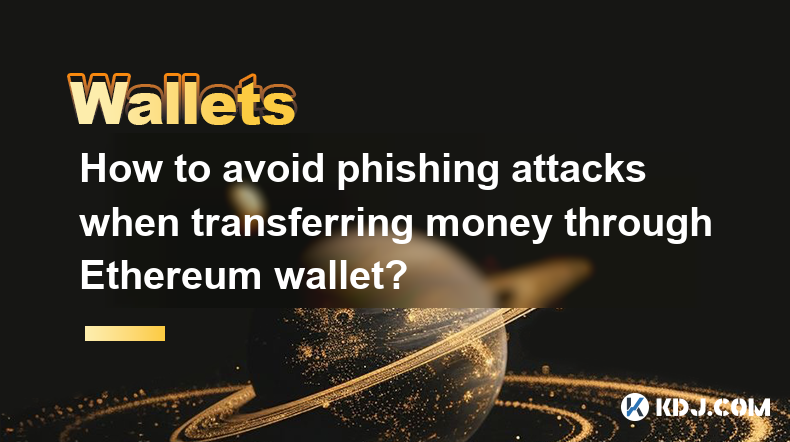
How to Avoid Phishing Attacks When Transferring Money Through Ethereum Wallet?
Ethereum, a leading blockchain platform, facilitates fast and efficient transactions. However, its popularity makes it a prime target for phishing attacks, aiming to steal users' cryptocurrency. Understanding how these attacks work and implementing preventative measures is crucial for protecting your funds. This article details strategies to safeguard your Ethereum wallet during transactions.
Understanding Ethereum Phishing Attacks
Phishing attacks exploit human error, tricking users into revealing sensitive information. In the Ethereum context, this often involves fraudulent websites or emails mimicking legitimate exchanges or wallet providers. These scams might promise lucrative rewards, request account details for "verification," or exploit urgency to pressure users into immediate action. The goal is always the same: to gain access to your private keys or seed phrase.
Identifying Suspicious Websites and Emails
Several red flags indicate a potential phishing attempt. Be wary of websites with poor grammar, misspellings, or unprofessional design. Legitimate platforms rarely use urgent or overly persuasive language. Always double-check the website address for subtle differences, like extra characters or incorrect domain names. Hover over links before clicking to reveal their true destination. Legitimate emails will use your name correctly and maintain a professional tone.
Securing Your Ethereum Wallet
Strong passwords and two-factor authentication (2FA) are essential. Use a unique, complex password for each online account, and enable 2FA whenever possible. This adds an extra layer of security, requiring a second verification code besides your password. Avoid using public Wi-Fi for transactions, as it increases vulnerability to man-in-the-middle attacks. Regularly update your wallet software to benefit from the latest security patches.
Safe Transaction Practices
Before initiating any transaction, meticulously verify the recipient's address. A single incorrect character can send your funds to the wrong wallet, irrecoverably lost. Double and triple-check the address against the intended recipient's information. Avoid using shortcuts or QR codes from untrusted sources. Always manually type the address into your wallet.
- Carefully review all transaction details before confirming.
- Never share your private keys or seed phrase with anyone.
- Only use official channels for support or assistance.
- Be cautious of unsolicited offers or promotions.
- Report suspicious activities to the relevant authorities.
Recognizing Phishing Tactics
Phishers employ various techniques to deceive users. They might impersonate support staff, promising help with a fictitious issue. They might create fake transaction confirmations, leading users to believe their transfer was successful when it wasn't. They might even manipulate social media or forums to spread malicious links. Maintaining skepticism and thorough verification are crucial in identifying these scams.
Using Hardware Wallets for Enhanced Security
Hardware wallets provide an extra layer of security by storing your private keys offline. This significantly reduces the risk of phishing attacks as your keys are never exposed to the internet. Transactions are signed offline, minimizing vulnerabilities. While hardware wallets are more expensive than software wallets, the added security justifies the investment, particularly for substantial Ethereum holdings.
Staying Informed and Updated
The landscape of cryptocurrency scams is constantly evolving. Stay informed about the latest phishing techniques and security best practices. Follow reputable news sources and security blogs for updates. Engage with the Ethereum community to learn from others' experiences and warnings. Proactive vigilance is your best defense.
Understanding Smart Contracts and Potential Risks
Smart contracts, while powerful tools, also present security challenges. Phishing attacks might involve malicious smart contracts designed to steal funds. Always audit the code of smart contracts before interacting with them. Avoid interacting with contracts from unknown or untrusted sources. Use reputable platforms and tools for smart contract verification.
Importance of Regular Security Audits
Regularly audit your Ethereum wallet's security practices. Review your passwords, 2FA settings, and transaction history. Identify any potential vulnerabilities and address them promptly. Proactive security measures significantly reduce the likelihood of successful phishing attacks. Keeping your software updated is a crucial part of this ongoing process.
Choosing Reputable Exchanges and Platforms
When using exchanges to buy, sell, or store Ethereum, choose reputable and well-established platforms with a proven track record of security. Read reviews and check their security measures before entrusting your funds. Avoid lesser-known or poorly reviewed exchanges that might have weaker security protocols, making them more vulnerable to phishing attacks.
Frequently Asked Questions
Q: What should I do if I suspect I've been a victim of a phishing attack?
A: Immediately change your passwords, disable 2FA on compromised accounts, and contact your exchange or wallet provider. Report the incident to the relevant authorities.
Q: How can I verify the legitimacy of an email or website claiming to be from my Ethereum wallet provider?
A: Check the sender's email address and website URL carefully for inconsistencies. Look for official contact information on the legitimate website and compare it to the communication you received.
Q: Are hardware wallets completely immune to phishing attacks?
A: While hardware wallets offer significant protection, they are not completely immune. Users can still fall victim to social engineering tactics where attackers trick them into revealing their seed phrase or other sensitive information.
Q: What is the best way to secure my seed phrase?
A: Write it down on paper, store it in a safe place offline, and never share it with anyone. Consider using a physical safety deposit box or other secure storage solution. Avoid digital storage, as this exposes your seed phrase to potential hacking.
Q: What should I do if I accidentally send Ethereum to the wrong address?
A: Contact the recipient immediately. Depending on the recipient's willingness and the blockchain's capabilities, it might be possible to recover your funds. This is not always successful, however. Learn from the mistake and take steps to prevent future errors.
Disclaimer:info@kdj.com
The information provided is not trading advice. kdj.com does not assume any responsibility for any investments made based on the information provided in this article. Cryptocurrencies are highly volatile and it is highly recommended that you invest with caution after thorough research!
If you believe that the content used on this website infringes your copyright, please contact us immediately (info@kdj.com) and we will delete it promptly.
- Bitcoin (BTC) price dips below ascending channel pattern as whales mirror a 2020 bull run signal
- 2025-04-01 07:50:12
- Mutuum Finance (MUTM) Has Been Relatively Quiet, But It's Building Fast
- 2025-04-01 07:50:12
- Cardano (ADA) Gains 4% This Week, Trading at $0.74 as Bullish Pressure Builds
- 2025-04-01 07:45:12
- Elon Musk Quashes Rumors of U.S. Government Using Dogecoin (DOGE) in Any Kind of Operations
- 2025-04-01 07:45:12
- Ethereum (ETH) and Solana (SOL) Prices Could Plunge as FTX Begins Creditor Repayments on May 30
- 2025-04-01 07:40:12
- Acting SEC Chair Rejects Enforcement, First US Bank-Issued Stablecoin, Bitcoin's Four-Year Cycle at Crossroads
- 2025-04-01 07:40:12
Related knowledge
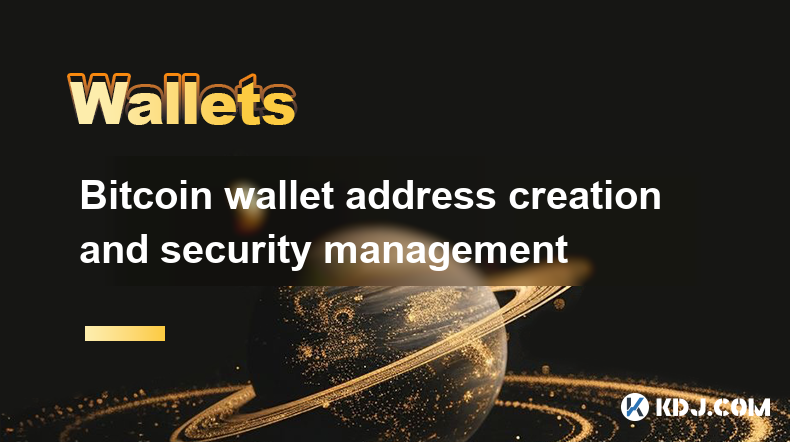
Bitcoin wallet address creation and security management
Mar 31,2025 at 10:56pm
Understanding Bitcoin Wallet AddressesA Bitcoin wallet doesn't store Bitcoin directly. Instead, it stores private keys which are long strings of characters. These keys grant access to your Bitcoin. Your public key, derived from the private key, is used to generate your Bitcoin wallet address, a unique identifier similar to a bank account number. This a...

How to easily generate a Bitcoin payment address
Mar 29,2025 at 10:49am
Generating a Bitcoin payment address might seem daunting, but it's actually quite straightforward. This process is crucial for receiving Bitcoin, as each transaction requires a unique address. Understanding how this works is fundamental to using Bitcoin effectively. This guide will walk you through the simple steps, regardless of your technical experti...
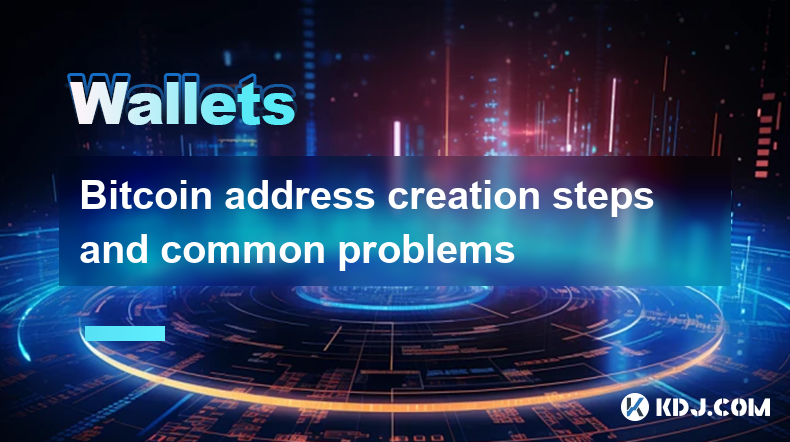
Bitcoin address creation steps and common problems
Mar 30,2025 at 06:07am
Understanding Bitcoin AddressesA Bitcoin address is a unique identifier, similar to a bank account number, used to receive Bitcoin. It's a string of alphanumeric characters generated from a public key, derived from your private key. Understanding the distinction between public and private keys is crucial for Bitcoin security. Your private key should be...
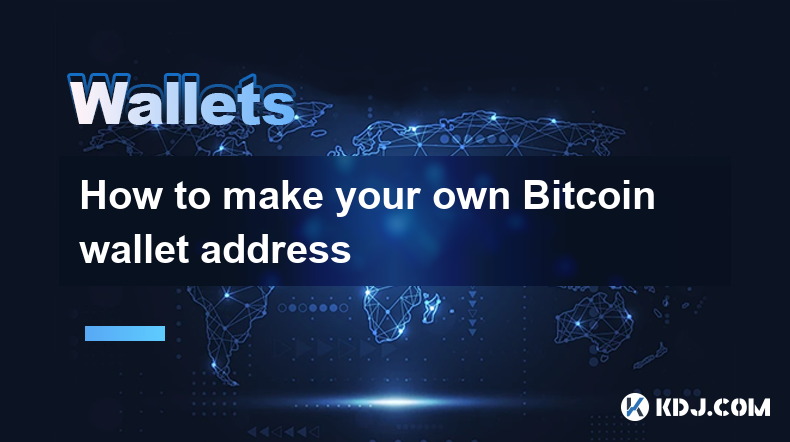
How to make your own Bitcoin wallet address
Mar 29,2025 at 08:42pm
Creating your own Bitcoin wallet address is crucial for securing and managing your Bitcoin holdings. It allows you to independently receive and send Bitcoin without relying on third-party services. This process involves understanding the different types of wallets and choosing the one that best suits your needs and technical expertise. Incorrectly gene...
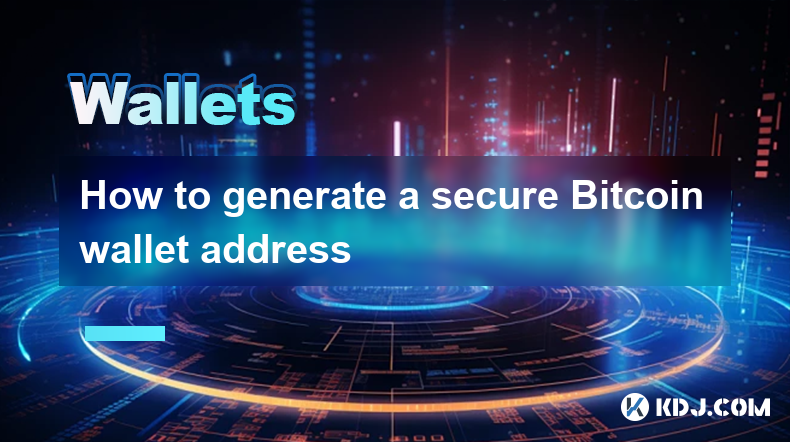
How to generate a secure Bitcoin wallet address
Apr 01,2025 at 03:14am
Understanding Bitcoin Wallet AddressesA Bitcoin wallet doesn't actually store your Bitcoin. Instead, it stores your private keys, which are long strings of characters that grant you access to your Bitcoin. Your public key, derived from your private key, is used to generate your Bitcoin address, a unique identifier similar to a bank account number. This...
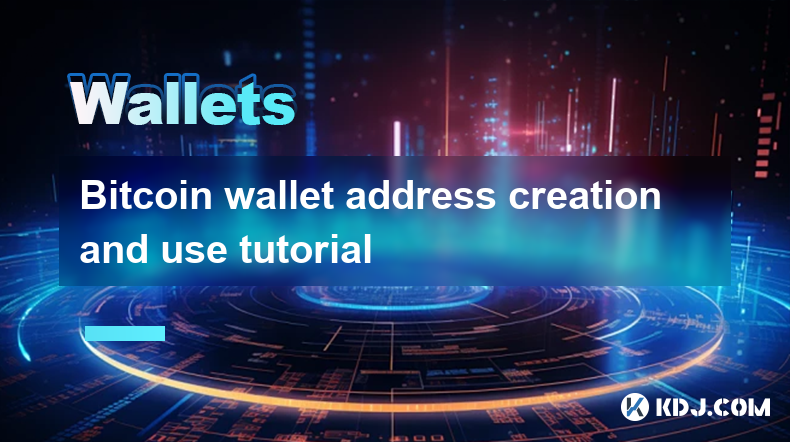
Bitcoin wallet address creation and use tutorial
Mar 29,2025 at 10:14pm
Understanding Bitcoin Wallet AddressesA Bitcoin wallet doesn't store Bitcoin in the way a traditional bank account does. Instead, it stores private keys, which are cryptographic secrets allowing you to access and spend your Bitcoin. Your Bitcoin address, on the other hand, is a public identifier, like an email address, that others can use to send you B...

Bitcoin wallet address creation and security management
Mar 31,2025 at 10:56pm
Understanding Bitcoin Wallet AddressesA Bitcoin wallet doesn't store Bitcoin directly. Instead, it stores private keys which are long strings of characters. These keys grant access to your Bitcoin. Your public key, derived from the private key, is used to generate your Bitcoin wallet address, a unique identifier similar to a bank account number. This a...

How to easily generate a Bitcoin payment address
Mar 29,2025 at 10:49am
Generating a Bitcoin payment address might seem daunting, but it's actually quite straightforward. This process is crucial for receiving Bitcoin, as each transaction requires a unique address. Understanding how this works is fundamental to using Bitcoin effectively. This guide will walk you through the simple steps, regardless of your technical experti...

Bitcoin address creation steps and common problems
Mar 30,2025 at 06:07am
Understanding Bitcoin AddressesA Bitcoin address is a unique identifier, similar to a bank account number, used to receive Bitcoin. It's a string of alphanumeric characters generated from a public key, derived from your private key. Understanding the distinction between public and private keys is crucial for Bitcoin security. Your private key should be...

How to make your own Bitcoin wallet address
Mar 29,2025 at 08:42pm
Creating your own Bitcoin wallet address is crucial for securing and managing your Bitcoin holdings. It allows you to independently receive and send Bitcoin without relying on third-party services. This process involves understanding the different types of wallets and choosing the one that best suits your needs and technical expertise. Incorrectly gene...

How to generate a secure Bitcoin wallet address
Apr 01,2025 at 03:14am
Understanding Bitcoin Wallet AddressesA Bitcoin wallet doesn't actually store your Bitcoin. Instead, it stores your private keys, which are long strings of characters that grant you access to your Bitcoin. Your public key, derived from your private key, is used to generate your Bitcoin address, a unique identifier similar to a bank account number. This...

Bitcoin wallet address creation and use tutorial
Mar 29,2025 at 10:14pm
Understanding Bitcoin Wallet AddressesA Bitcoin wallet doesn't store Bitcoin in the way a traditional bank account does. Instead, it stores private keys, which are cryptographic secrets allowing you to access and spend your Bitcoin. Your Bitcoin address, on the other hand, is a public identifier, like an email address, that others can use to send you B...
See all articles























































































